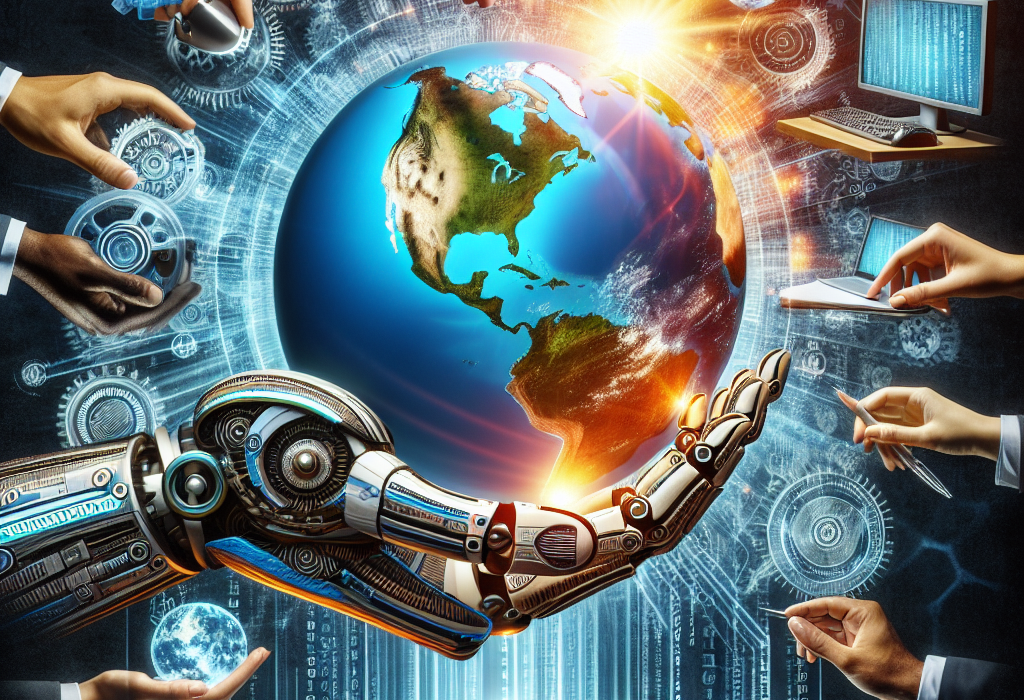The Dawn of AI: Transforming Global Business Landscapes
Artificial Intelligence (AI) is no longer a futuristic concept nestled within the realms of science fiction; it is a tangible and integral force that is actively reshaping the global business landscape. From multinational conglomerates to burgeoning startups, AI’s impact is profound, far-reaching, and multifaceted. This article delves into the various ways AI is revolutionizing industries, streamlining operations, and fostering innovation across the globe.
Efficiency and Productivity Enhancement
One of the most significant impacts of AI on global business is the transformation in efficiency and productivity. AI-powered automation tools are capable of performing repetitive, mundane tasks at a speed and accuracy that surpasses human capabilities. This has freed up valuable time for employees to focus on strategic initiatives that require human ingenuity and creativity. For instance, AI-driven customer service bots handle queries around the clock, reducing wait times and providing instant support, thus enhancing overall customer satisfaction and loyalty.
Data-Driven Decision Making
In today’s data-centric world, businesses are inundated with vast amounts of information. AI systems, particularly those specialized in data analysis and interpretation, assist businesses in making more informed, data-driven decisions. Machine learning algorithms can identify trends, patterns, and anomalies within datasets that would be otherwise imperceptible to the human eye. This predictive capability allows businesses to optimize supply chains, forecast market trends, personalize marketing efforts, and minimize risks, thereby making more strategic and profit-driven decisions.
Innovative Product Development
AI is fueling innovation by enabling the development of smarter, more efficient products and services. In the automotive industry, AI is the driving force behind the development of autonomous vehicles, promising to revolutionize transportation with safer and more efficient travel. Healthcare, too, is benefiting from AI-powered diagnostic tools capable of identifying diseases at early stages, thus improving patient outcomes. The finance sector utilizes AI to develop sophisticated trading algorithms and fraud detection systems, enhancing security and profitability.
Global Workforce Transformation
The integration of AI into business processes is also reshaping the global workforce. While there is an understandable concern regarding job displacement due to automation, AI is simultaneously creating new opportunities and roles that did not exist a decade ago. There is a growing demand for AI specialists, data scientists, and other tech-focused professions. Furthermore, businesses are investing in upskilling their existing workforce to adapt to the evolving landscape, fostering a dynamic environment where humans and AI-powered tools work synergistically.
Global Market Expansion
AI-driven technologies are enabling companies to penetrate new markets with greater ease. By leveraging AI analytics, businesses can gain insights into consumer behavior and preferences across different regions, allowing for the tailoring of products and services to meet local demands. Language processing algorithms break down barriers, facilitating smoother communication and negotiations in international markets. In essence, AI is providing businesses with the tools to operate more effectively on a global scale.
Challenges and Ethical Considerations
Despite the myriad benefits AI brings to the global business arena, it is not without its challenges and ethical considerations. Issues surrounding data privacy, algorithmic biases, and the ethical use of AI-generated data are becoming increasingly prominent. Businesses must navigate these concerns by implementing robust data governance frameworks and ensuring transparency in their AI practices. Additionally, there is a need for international cooperation and regulatory measures to address the ethical implications and ensure that the benefits of AI are equitably distributed.
Conclusion
Artificial Intelligence is undoubtedly a catalyst for change in the global business environment. Its ability to enhance productivity, drive innovation, transform workforces, and expand market reach underscores its pivotal role in the current and future business landscape. However, as businesses continue to harness the power of AI, it is imperative to address the ethical considerations and challenges to foster a sustainable and inclusive AI-driven economy. The dawn of AI presents unprecedented opportunities, and those who leverage its potential responsibly will find themselves at the forefront of global business innovation.
















Leave feedback about this
You must be logged in to post a comment.